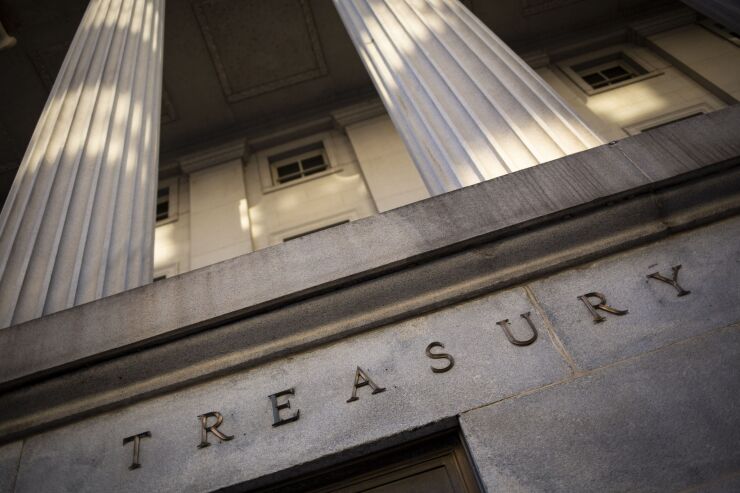
The Financial Stability Oversight Council on Friday highlighted the mounting distress in the commercial real estate sector as well as risks from stablecoins and third parties that work with financial institutions in its annual report.
The council voted to approve its 2024 annual report during an open meeting, and Treasury Secretary Janet Yellen — who serves as chair of the FSOC — highlighted the need for the agency to remain properly staffed to monitor potential systemic risks.
"Across these areas, progress has been enabled by a strengthened Council," she said. "When I took office, the Council's staff at Treasury had been cut to single digits, and the infrastructure supporting interagency coordination had been scaled back significantly [meaning] we were less equipped to identify and respond to risks to the financial system."
This year's report delivered a more urgent assessment of commercial real estate distress, signaling escalating risks across key sectors. Compared with 2023, when the council laid out more broad concerns, the latest FSOC analysis zeroes in on the structural challenges hammering office properties, where remote work has driven vacancy rates to decade highs, particularly in urban hubs.
Even multifamily properties, which were once supported by strong demand, are now experiencing declining values, rising vacancies and revenue pressures, particularly in oversupplied or rent-regulated markets.
As evidence of mounting stress, the report cites the unprecedented loss incurred on a tranche of a private label commercial mortgage-backed security that was rated AAA — the first loss of its kind since the global financial crisis.
AAA-rated securities are typically considered the safest investments, and a loss in such an asset signals deep stress in the market. The report continued to underscore the pressures on the office property market, driven by shifts like remote work, which could lead to greater financial instability.
The FSOC also touched on the persistence of cyber incidents and their potential to disrupt financial stability. Such attacks have nearly doubled since before the COVID-19 pandemic and while these incidents haven't yet had significant systemic impacts, the report notes a severe attack could disrupt operations, hinder liquidity access, increase the likelihood of bank failures and erode confidence in the financial system.
The council recommends that public and private sectors collaborate to share information on cyber risk. Specifically, the FSOC urged the executive branch's Financial and Banking Information Infrastructure Committee to work with industry-led groups like the Financial Services Sector Coordinating Council and the Financial Services Information Sharing and Analysis Center to enhance information sharing, assess risks and address potential cyber threats.
The 2024 report expands its focus on risks posed by complex relationships between third-party service providers and the financial system, a focus of many member agencies over the past year. While the 2023 report highlighted the benefits and risks of third-party arrangements, the 2024 discussion emphasized regulatory gaps and the need for legislative action. Given increased barriers to direct oversight of third parties by financial institutions and regulators, the 2024 report calls for Congress to enhance examination and enforcement powers for agencies who do not have explicit powers to regulate third parties.
"The authority to supervise third-party service providers varies among financial regulators. To enhance third-party service provider information security and address other critical regulatory challenges," the body wrote, "the Council recommends that Congress pass legislation that ensures that the FHFA, NCUA and other relevant agencies have adequate examination and enforcement powers to oversee third-party service providers that interact with their regulated entities."
The council also discussed the risks associated with stablecoins, which form the nexus between traditional finance and the crypto market. Stablecoins can face runs if holders doubt their redemption or asset value, creating risks related to reserve management and issuer structures according to the report. Concentration risk is notable, with issuer Tether dominating the market with about 70% of the market's value.
Additionally, the opacity and complexity of stablecoin operations pose further risks, as few issuers fall under state or federal regulations that enforce reserve disclosures or audits. USDC's issuer, Circle, regulated by New York's Department of Financial Services, is an exception.
Other major issuers, like Tether, rely on voluntary attestations that lack full transparency.
Regulators have noted that stablecoins holding noncash assets could trigger market impacts if liquidated in large quantities during a run. A lack of clear information on reserve management can mislead holders and fuel market volatility.
FSOC said regulation of stablecoin reserves, capitalization and redemption rights are necessary.
"The Council recommends that Congress pass legislation creating a comprehensive federal prudential framework for stablecoin issuers to address run risk, payment system risks, market integrity, and investor and consumer protections, including for entities that perform services critical to the functioning of the stablecoin arrangement," the council wrote. "However, as the Council noted previously, if comprehensive federal legislation is not enacted, Council members remain prepared to consider steps."






